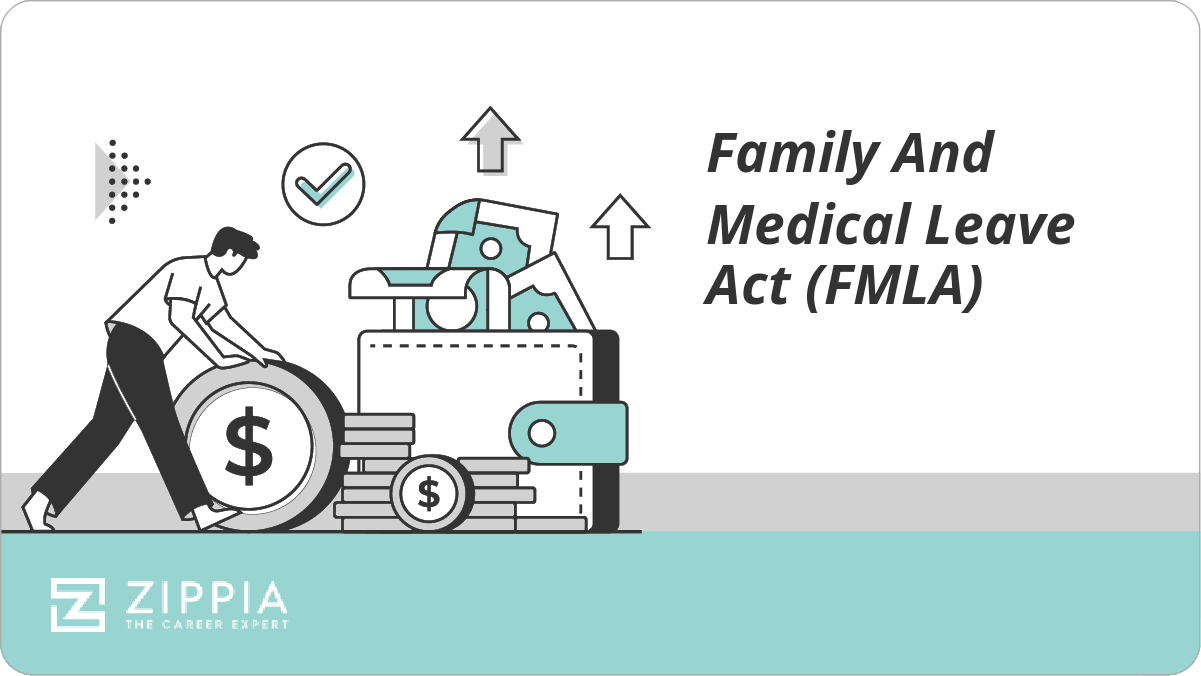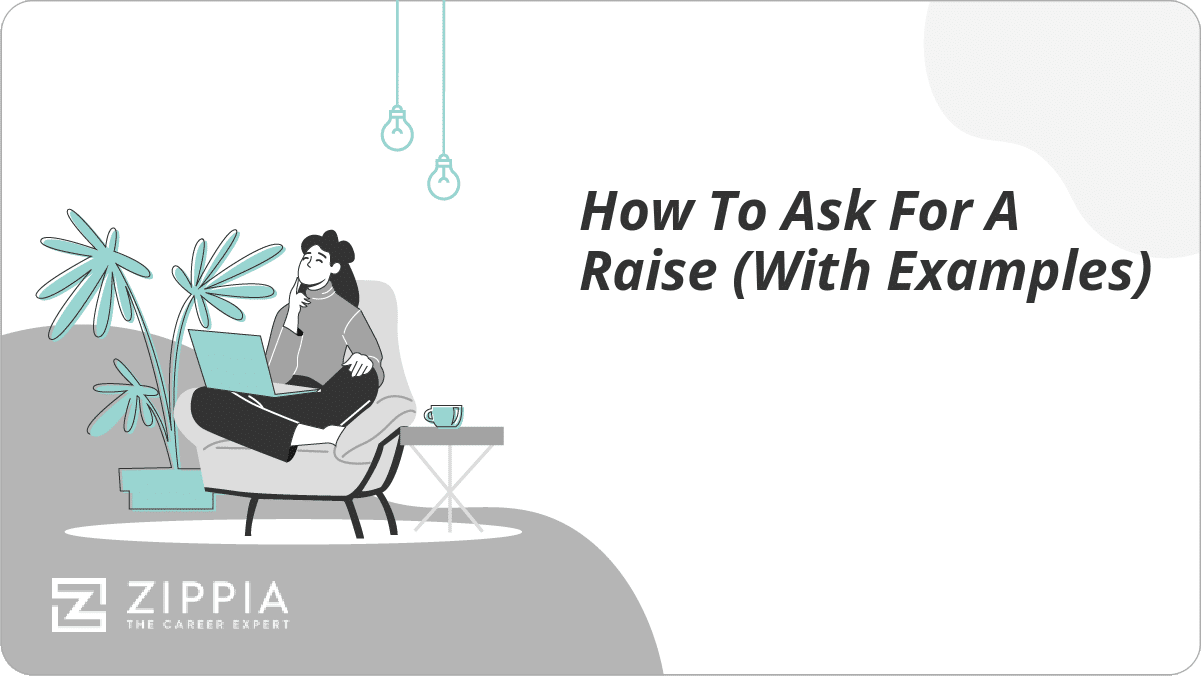- Benefits
- Paid Time Off Policy (PTO)
- Leave of Absence Policy
- What Are Floating Holidays?
- What Are Employer-Paid Holidays?
- How Does Holiday Pay Work
- How Does A Stipend Work
- Cash a Paycheck Without a Bank Account
- What Is Compensatory Time?
- What's Unlimited Vacation?
- What Is A Commission?
- What Is A Mileage Deduction?
- Semimonthly Vs Biweekly Pay Schedules
- Flexible Spending Account
- Stock Options At Job
- Benefits Package
- Overtime Pay
- Workers Comp
- What Is Fmla
- Hazard Pay
- Tuition Reimbursement
- Discretionary Vs. Non-Discretionary Bonus
- What Are Union Benefits
- What Is An HRA Account
- What Is Cobra Insurance
Find a Job You Really Want In
When a circumstance arises that involves an employee’s family duties or a health situation, the federal government provides them with time-off under the Family and Medical Leave Act (FMLA).
While there are stipulations that affect an individual’s eligibility to receive FMLA time-off, it acts as a service for individuals to give them job security in uncertain or complicated personal times.
Key Takeaways:
-
The Family and Medical Leave Act, or FMLA, is a law that protects employees in certain circumstances to take up to 12 weeks of unpaid leave without losing their job or benefits.
-
To take FMLA time off, you must work at a company that employees at least 50 people, and you must have worked at the company for at least a year or have worked 1,250 part time hours with the last year.
-
Reasons covered under FMLA include to care for a newborn child of an employee after their birth and to care for a spouse, parent, or child of the employee with a serious health condition.

What Is the Family and Medical Leave Act (FMLA)?
The Family and Medical Leave Act is a United States federal labor law that was established in 1993. Its purpose is to accommodate the fact that employees have life concerns outside of their job for which they’ll sometimes need time off to deal with. The FMLA states that eligible employees must receive an unpaid leave of absence with protection from losing their job in the event of specified family reasons or health issues.
The key to the FMLA is that the employee maintains their health benefits and doesn’t have to worry about being let go from their position due to unavoidable absences. This gives them the time and space to handle the circumstance at hand without any additional stress from work.
Some companies treat the FMLA’s recommendations as the bottom line and offer their employees extended time off during these scenarios to attract the best candidates to hire.
Employees covered under the FMLA are entitled to 12 weeks of unpaid time-off out of the year if they encounter a family or medical situation defined by the act.
If the reason for needing the leave is to look after a military service member in the immediate family who experienced a serious medical condition, the period is extended to 26 weeks out of a 12-month period.
These weeks must be full workweeks, but they don’t have to be taken consecutively. Federal holidays won’t be counted towards FMLA time-off.
If you “work at a location where the employer has 50 or more employees with 75 miles,” that employer must comply with the FMLA terms for all eligible employees and circumstances.
Choose From 10+ Customizable Resume templates
Zippia allows you to choose from different easy-to-use resume templates, and provides you with expert advice. Using the templates, you can rest assured that the structure and format of your resume is top notch. Choose a template with the colors, fonts & text sizes that are appropriate for your industry.
Who Is Eligible for Family and Medical Leave?
Although the FMLA conditions sound perfect for everyone to maintain a work-life balance, it’s only available for employees whose employment status meets the criteria for eligibility.
Employees covered by the FMLA for unpaid leave must:
-
Work at a company that’s employing more than 50 individuals
-
Have worked with their employer for at least a year
-
Worked at least 1,250 hours (part-time) over the past year before the leave
What Reasons Are Covered to Take off for Family and Medical Leave?
Employees who meet all the requirements to be covered by the Family and Medical Leave Act also need to understand the reasons that qualify for taking the time-off. The following reasons apply to any eligible male or female employee.
During a period of 12 months, eligible employees can claim unpaid time-off with job security for the following reasons:
-
To care for a newborn child of an employee after their birth
-
To care for a child who’s recently been placed for adoption or foster care with the employee
-
To care for a spouse, parent, or child of the employee with a serious health condition
-
Medical leave when the employee has a serious health condition that makes them unable to work
-
Handling emergencies with a family member on active military duty
The Purpose of the Family and Medical Leave Act (FMLA)
As the name might imply, the purpose of the Family and Medical Leave Act is to protect employees while they care for themselves and their loved ones. The FMLA in particular wishes to balance the needs of the employees with the needs of employers.
The act states its purposes to be:
-
Protecting families. The FMLA wishes to balance the demands of employment with those of families while promoting stability and economic security for the families. This is, in part, because it is in the national interest to preserve family integrity.
-
Protect employees. The FMLA entitles employees to take reasonable leave due to specific medical or family scenarios.
-
Accommodate employers. While meeting the needs of employees, the FMLA takes into account the interest of employers.
-
Uphold the 14th Amendment. The FMLA also wants to make sure that it is consistent with the Equal Protection Clause of the Fourteenth Amendment. This is to minimize the potential for employment discrimination on a gender-neutral basis and to promote the goal of equal employment opportunity.
It should be noted that while the FMLA directly states these purposes, there are implicit purposes as well. For example it is good for the economy to allow workers the right to take off time for health and family because otherwise it could lead to firings, unemployment, and low productivity. The FMLA also promotes a healthy dialogue between workers and their employees, which is essential for a developed economy.
FMLA Frequently Asked Questions
-
Does an employer have to pay workers on FMLA leave?
No, an employer is not required to pay an employee while they’re taking an FMLA leave for any reason.
Employees can choose to use their paid sick and vacation days to cover a portion or all of their leave. The time is still considered federally protected under the Family and Medical Leave Act, even if paid time-off is used, as long as it is for one of the designated reasons.
-
Is an employer responsible for informing employees about their FMLA rights?
Yes, an employer covered by FMLA regulations is required to post the provisions and details of employee rights noticeably. This posting also needs to have the information necessary for reporting FMLA violations.
While the employer is ordered to keep a posting up about FMLA, it’s the employee’s responsibility to request it. Once the time-off is asked for, the employer needs to inform them of their rights and requirements under the FMLA.
Additionally, the employer needs to tell them in detail what the company expects of them throughout the leave, such as providing certification of the time-off reason.
-
Does unused leave time carry over to the next year?
No, the 12 or 26 weeks maximum of guaranteed leave for eligible employees and reasons are only available within the given 12-month long period.
Unused time does not carry over and is given up. This is why, if possible, it is important to plan out your use of FMLA ahead of time with your HR department to understand how many FMLA days you will need and have.
-
Can mothers and fathers both take an FMLA leave to bond with a new child?
Yes, the federal regulations of the Family and Medical leave act apply to anyone who needs time to bond with a new child, regardless of gender.
Since paternal and maternal leave is needed to connect with a new child after birth, adoption, or taking in for foster care, both men and women are entitled to claim FMLA leave time.
This time off must be taken within the first year of a child’s birth, adoption, or placement in a foster care household.
-
When do you tell your employer you’re taking an FMLA leave?
Taking time-off for FMLA reasonings is a unique situation because sometimes it involves unforeseen medical problems.
However, giving your employer as much notice as possible is still the most professional thing to do. It puts a company in a stressful situation if one of their employees needs to leave for an extended time without much notice.
Before discussing the possibility of taking an FMLA leave, make sure that your employment situation and reason for the time-off are covered under the act. It’s not your employer’s job to find out this information for you, but they’re required by law to answer any questions you have.
FMLA covered events that the employee has former knowledge of, like the birth of a child around a certain time, must be brought up to an employer at least 30 days before the intended leave.
In circumstances that provide little to no notice, like a random injury, employers are required to be a bit more lenient with timing.
-
What constitutes a serious health condition according to the FMLA?
The term ‘serious health condition’ doesn’t give many specifics into what injuries and illnesses are covered.
Generally, to be considered a serious health condition, the employee must face at least one of the following conditions:
-
A health condition, illness, or injury that requires an overnight stay at a healthcare facility or hospital
-
A health condition, illness, or injury that prevents an employee from working for a period of three or more days consecutively to seek medical counsel
-
A health condition or illness that presents a chronic issue in an employee’s life but flares up occasionally, which requires treatment and prevents them from working
-
Medical appointments and illnesses associated with pregnancy
-
-
Is organ donation to a non-relative covered by FMLA leave?
Yes, while organ donation to a non-relative wouldn’t be covered by the FMLA leave for the reason of caring for an immediate relative, it would still be covered because the employee undergoes a serious health condition.
Organ donation is an intense procedure that requires at least an overnight stay at the hospital and post-surgery time to recover fully. These conditions qualify it as a serious medical condition, and the time-off would be covered by the FMLA for this reason.
-
Do an employee’s benefits continue through the leave?
Yes, all of an employee’s benefits, including health insurance for themselves and their family, continue throughout their leave time.
One of the main purposes of enacting the Family and Medical Leave Act is to preserve an employee’s benefits during their protected time-off. That is why a lot of people take FMLA in the first place. Employees who have to take unpaid leave want to at least ensure that their medical expenses are still covered.
-
Can my employer require an employee to get a second medical opinion?
Yes, your employer can request proof of your medical condition and even ask you to get a second opinion if they’re unsure of the diagnosis’ validity.
However, some rules come along with this. If an employer is requesting that an employee get a second or third opinion on their medical condition, they must cover the cost of the visits. Additionally, the employer needs to give the employee a minimum of 15 days to retrieve and return these documents to them.
-
Can an employer demand to see an employee’s medical records?
No, an employee is still never required to release their medical records to their job due to national privacy regulations.
While an employer isn’t entitled to see an employee’s medical records for any reason, they can request a medical certification from a doctor stating that the serious health condition being claimed is an accurate diagnosis.
-
Is an employer allowed to change an employee’s job while they’re on medical leave?
Not entirely. When an employee takes time off for FMLA related reasons, their employer must allow them to return to their same job or an equivalent one.
A job that would be considered equivalent must have:
-
The same timing and schedule
-
The identical responsibilities
-
Warrant the same level of skill
-
Provide the same salary and benefits
-
References
Department of Labor. “Family and Medical Leave Act.” Accessed on September 25, 2022.
- Benefits
- Paid Time Off Policy (PTO)
- Leave of Absence Policy
- What Are Floating Holidays?
- What Are Employer-Paid Holidays?
- How Does Holiday Pay Work
- How Does A Stipend Work
- Cash a Paycheck Without a Bank Account
- What Is Compensatory Time?
- What's Unlimited Vacation?
- What Is A Commission?
- What Is A Mileage Deduction?
- Semimonthly Vs Biweekly Pay Schedules
- Flexible Spending Account
- Stock Options At Job
- Benefits Package
- Overtime Pay
- Workers Comp
- What Is Fmla
- Hazard Pay
- Tuition Reimbursement
- Discretionary Vs. Non-Discretionary Bonus
- What Are Union Benefits
- What Is An HRA Account
- What Is Cobra Insurance

















